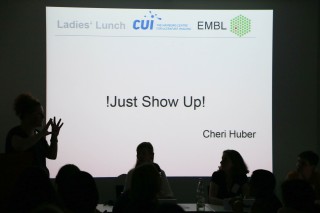At some point an impostor’s cover will be blown. But what happens, when somebody only believes to be posturing? When honors, awards, salaries or positions really are due to one’s professional achievements? During the latest Ladies’ Lunch with the title “Making It But (Sometimes) Faking It? – The Impostor Syndrome in Scientific Careers“, women scientists had a closer look at the phenomenon.

The lunch guests listened carefully to such honest and informative words and advices. Credit: Rosemary Wilson, EMBL
“The impostor syndrome is not a psychological issue that needs to be cured,” said CUI equal opportunity officer Marie Lutz at the beginning of the event. “It is rather a set of feelings and a pattern of perception, which can influence the conception of one’s accomplishments in a negative way.” The phenomenon is widely spread in the scientific community; female scientists from all levels of a career were interested in hearing more about it: Almost 40 Phds, Postdocs, Junior and full Professors from various institutions on Campus Bahrenfeld had accepted the invitation issued together by CUI and EMBL. Mildred Dresselhaus Guest Professor Elspeth Garman (University of Oxford, UK) and CUI Professor Arwen Pearson (Universität Hamburg) shared their personal experiences with this specific phenomenon. Thanks to their open words it was noticeably easier for the participants to follow Career Coach Katrin Teske-Temperton’s request to share impostor experiences in small teams.
Jobs are not offered to fulfill a quota
Equal opportunity measures may even foster the imposter syndrome, as it is the case when women get the feeling of having received an offer due to a quota, not due to their qualifications. Renowned professors in the group, among them Daniela Pfannkuche and Erika Garutti, however, had clear opinions about such feelings: They called it a myth, that woman who are not sufficiently qualified would get a job offer just to fulfill a quota. Arwen Pearson: “Don’t believe the myth.” The lunch guests listened carefully to such honest and informative words.
Marie Lutz: „It is great to see, that we can offer an event as a campus-wide platform for female scientists of all career levels for discussing such topics openly, that everybody would usually try to solve on her own. This is another important aspect of our engagement in equal opportunity: addressing challenging topics, analyzing them and learning from others.”
Read what Rosemary Wilson, science communicator at EMBL, thinks about imposter syndrome and how to handle it. Rosemary Wilson has organized the event together with Marie Lutz.
Advices how to overcome impostor syndrom:
- Remain curious, educate yourself
- Be open and admit what you don’t understand
- Ask questions: when you dare to ask you get a lot of communication
- Don’t be shy and apply, BUT be prepared not to get it
- Allow feelings, as they can protect you from failure, but at some point they are no longer helpful
- Don’t do yourself down; stop making what you’re feeling so obvious
- Don’t give your problems so much importance, shift your focus
- Have strategies: write down achievements (do list AND done list)
- Collect good mails, read them on bad days
- Network
- Have the courage to say yes when you are offered something
- Keep other people informed about what you are doing

